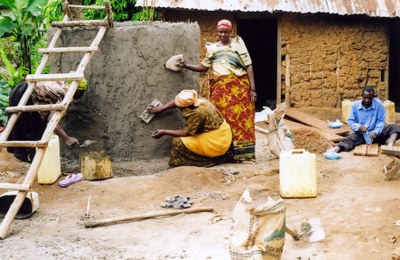We have a teaspoon to empty the Atlantic
 Ten years ago, during the second World Water Forum in The Hague more than a hundred water professionals came together to institutionalise the Gender and Water Alliance. In general it was clearly visible that (mainly white) men in black suits were the decision-makers regarding water from various sources and for all sorts of uses. In this particular Water Forum NGOs were encouraged not to organise a parallel forum, and were given opportunities to join the mainstream. Thus the participants came from other nooks and corners of this world than is usually the case with large conferences, including many persons with expertise of the daily use of water, representing ordinary women and men, small-holding farmers, gender experts, NGOs and CBOs worldwide.
Ten years ago, during the second World Water Forum in The Hague more than a hundred water professionals came together to institutionalise the Gender and Water Alliance. In general it was clearly visible that (mainly white) men in black suits were the decision-makers regarding water from various sources and for all sorts of uses. In this particular Water Forum NGOs were encouraged not to organise a parallel forum, and were given opportunities to join the mainstream. Thus the participants came from other nooks and corners of this world than is usually the case with large conferences, including many persons with expertise of the daily use of water, representing ordinary women and men, small-holding farmers, gender experts, NGOs and CBOs worldwide.
Clearly something needed to be done to remove the contradiction between the interests of water users and that of the decision-makers. On the one hand the latter group would need to learn about the impact of their decisions on the ground, and how that would be different for women and men, young and old, poor and rich, rural and urban, hailing from different ethnic groups in a great variety of contexts. On the other hand all these different water users represent a lot of knowledge about their different contexts. For them to be able to contribute with their skills and knowledge they would need to be supported to empower themselves. To develop an approach taking both directions into account, combining the technical and the social aspects of water management, the Gender and Water Alliance was given its mandate. The Netherlands and the United Kingdom enabled the work to begin by committing funding for four years, and then the Netherlands funded us for another five years, until this year 2010.
Change did happen!
Now, ten years later, a lot of water has completed many cycles from the oceans to the clouds to rain, through plants and the soil, used by people, then to lakes and rivers and slowly back to the oceans again. Also a lot of awareness has been raised on the gender aspects of water management through capacity building, advocacy, publications, dissemination, information sharing and pilot studies, by which we can state that many people have learned and adapted their attitude. The difference from ten years ago is really amazing.
Applying one’s understanding of gender relations in the water sector remains tough. Governments come and go; so do decision-makers. Economising at all levels usually results in gender budget items being deleted first, as is seen everywhere. Nobody doubts the need for more infrastructure, but to make water and sanitation facilities appropriate and usable, needs explicit attention for the diversity of users, especially by gender.
Stamina is needed
With the selection by the Netherlands’ Development Cooperation Fund for NGOs for 2011-2015 all the women and gender organisations and the HIV/AIDS and migrants’ organisations were discarded. For GWA and for many others it will be difficult to continue the demand-driven work that depends so much on core funding.
Is it reasonable to expect that centuries of inequality worldwide will be ironed out in one or two decades? GWA’s previous chairperson Ethné Davey from South Africa uses the metaphor of the teaspoon we have been given to empty the Atlantic. It would seem to be a small step forward to graduate to a soup spoon after ten years, but it does not happen. Women and men are equal in their tax paying obligations, should this not result in more equality in spending these funds?
We count on you
With a global food crisis, financial crisis and climate change the GWA has massive work to do; to support women in bringing different solutions to the fore, not only looking at technology and the short term.
We count on the continuous support of the members and partner organisations we have so fruitfully worked with in the ten years that have gone by so fast. We are confident that because of our visible and effective results GWA will be able to find new donors, even in times of financial crisis.


